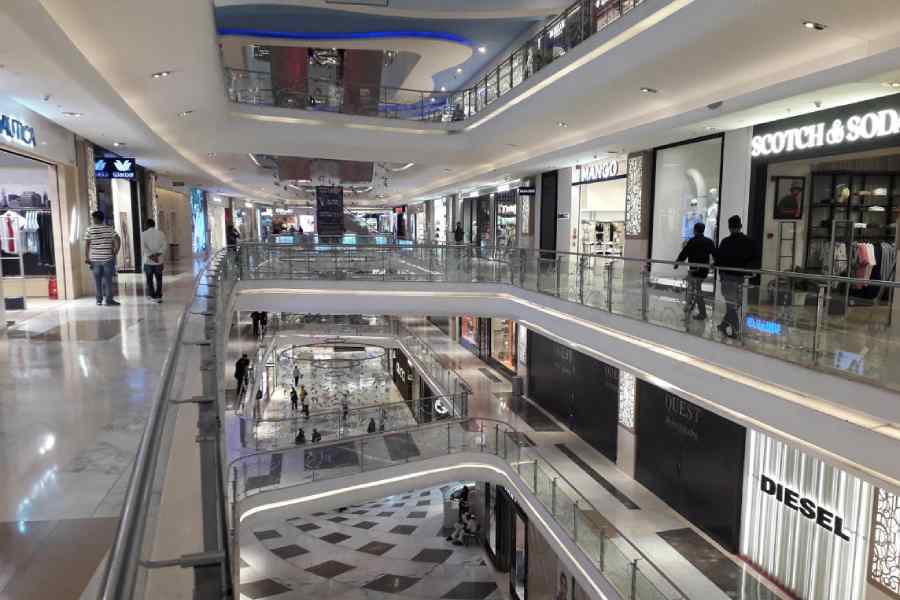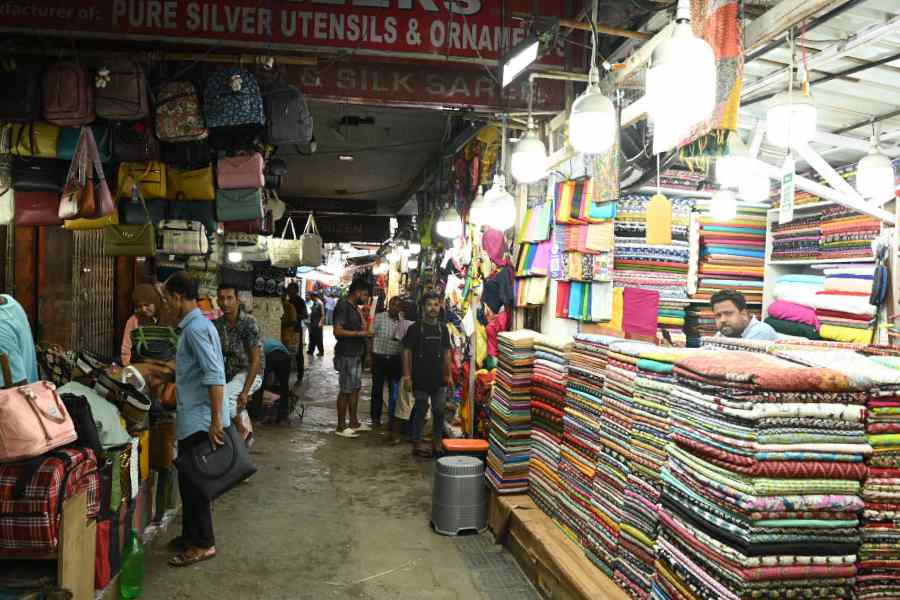The spectre of an old and dreaded demon is back to haunt the city at probably the worst time, its biggest business season.
A bandh called by the BJP on Wednesday to protest alleged “police excesses” on a march to Nabanna brought back images that many thought were relics of the past.
The roads were deserted, schools were shut, trains that ferry the city’s workforce from the suburbs were stranded and bandh supporters clashed with the police on thoroughfares. As screens beamed these images, many planning to brave the bandh took a step back.
Buses plied on Wednesday but most were empty. The shops were mostly open but there were hardly any buyers.
What played out on the city’s streets over the past two days has instilled fear, retailers across the city told this newspaper.
With Durga Puja just over a month away, traders fear that the politics of disruption that seems to have hijacked the organic protests triggered by the RG Kar brutality is here to stay. The past few days have seen a plunge in sales and Tuesday and Wednesday were “very bad”, they said.
Missing din
Around 1pm on Wednesday, cops posted at the Gariahat intersection far outnumbered shoppers.
Prasenjit Karmakar, one of the three men working at a stall on a pavement near Traders’ Assembly, was fidgeting with his phone. The stall opened at 10am but was yet to see the day’s first sale.
“Something scary is happening every day. People are wary of stepping out to shop. The festive mood (mejaj) is missing,” said Karmakar.
He sells unstitched clothes for salwar suits and blouses. For him, the peak season starts after August 15. Women buy clothes early because they have to give them to tailors. On a weekday in August-end, the stall usually sees a sale of over ₹10,000.
“On Tuesday, it was less than ₹2,000. Look around and you will know why,” Karmakar said.
He pointed to rows of empty stalls on either side of the intersection, usually chaotic because of hawkers and shoppers.
Mothers who come to drop kids at schools and women college students are Karmakar’s customers. They also comprise a bulk of Gariahat shoppers. Most private schools were shut on Wednesday.

A deserted city mall, which would otherwise have teemed with Puja shoppers, during the BJP’s bandh on Wednesday. Picture by Bishwaroop Dutta
Karmakar is the sole earning member of his family.
In Hatibagan at the other end of the city, Arjun Pal, who runs a franchise store of an Indian fashion brand, had more people to worry about. Pal employs three persons and usually hires more on a contract basis in the run-up to Puja to manage the rush. His income in the 45 days preceding Durga Puja is more than the combined income in the previous six months.
“Every year, we bank on a buying spree that begins in late August. But that has not been the case this year. Given how things are, I don’t intend to hire more men,” he said.
He was apprehensive of a political campaign that was getting shriller and erratic.
“Many are calling for a boycott of Durga Puja to protest what has happened at RG Kar. For a small business like ours, such a call spells doom,” said Pal.
There are close to 43,000 recognised Durga pujas in Bengal, of which around 3,000 are in Calcutta.
A 2019 research by the British Council focused on the Durga Puja economy in Bengal said the “economic worth of the creative industries around Durga Puja in West Bengal is ₹32,377 crore, which is the size of the economy of many smaller countries”.
Around 1.30pm on Wednesday, the atrium of South City Mall was deserted. Quest, a few kilometres north, had even fewer people.
“We have yet to make the first sale,” the manager of the store of a women’s fashion brand said after 2pm.
On a weekday in late August, the South City store usually registers sales of around ₹1.5 lakh. On Tuesday, sales were down to ₹40,000, he said.
“There was no billing after 4pm and the mall was almost empty by 7pm,” he said.
At Quest, a man at the counter of a footwear store was also waiting for the day’s first buyer.
Bijoy Bakuli comes from Shyambazar, the epicentre of the protests. “My family members are worried until I return home at night because of frequent clashes there. The same fear has crept into the minds of many people,” he said.
The fear is not only limited to physical harm.
There has been a concerted online attempt to undermine Bengal’s biggest festival as a mark of protest against the rape and murder.
A group of young women this newspaper spoke to said they were not sure if it was “okay to go shopping now”. They said their friends had been trolled online for not being against festivities in such a scenario.
Fear intensifies
Tyres burning on roads, bus windows smashed, a bullet piercing a car’s windshield near Calcutta and flash road blockades in the city prompting diversions, a cocktail of images on Wednesday exacerbated the fear.
A moral justification of the violent protests has compounded the problem.
A 65-year-old garment retailer on Lindsay Street was watching TV for most of Wednesday morning and afternoon. “I had thought we were done with the bandh culture. I never expected it to return in one lifetime,” he said.
The man said he was startled to see bus drivers wearing helmets in Howrah.
The Left regime was infamous for strikes that meant a complete shutdown, often aided by the state machinery.
After coming to power in 2011, the Mamata Banerjee administration officially declared a stop to bandhs and had been successful in keeping them away so far.
Wednesday was different.
Even in the heart of the city, many felt it was “risky” to be on the streets.
“With what is going on as part of peaceful protests, I am scared to send my daughter to school by bus. Going out to shop can wait now,” said a homemaker in Ballygunge.
Since Wednesday morning, BJP leaders were seen “urging” or “pressuring” traders to shut shop in several parts of the city.
BJP leaders Rupa Ganguly and Agnimitra Paul were detained by the police in Gariahat while telling traders who defied the bandh to down their shutters.
Calcutta police said 76 people were arrested for trying to cause disruption on Wednesday. “We have footage of more disruptors. We are trying to identify them,” said Meeraj Khalid, joint commissioner of police (headquarters).
Additional reporting by Monalisa Chaudhuri










